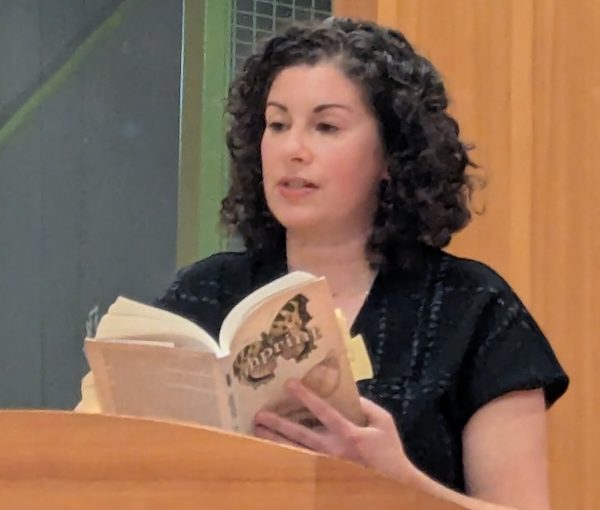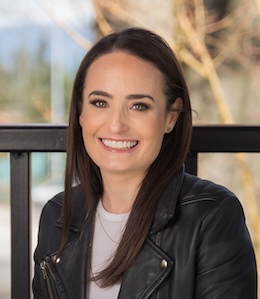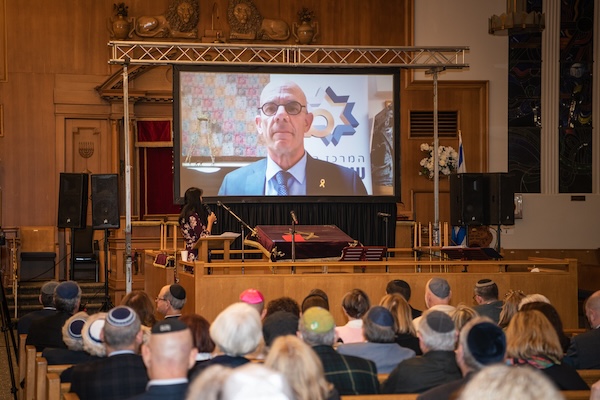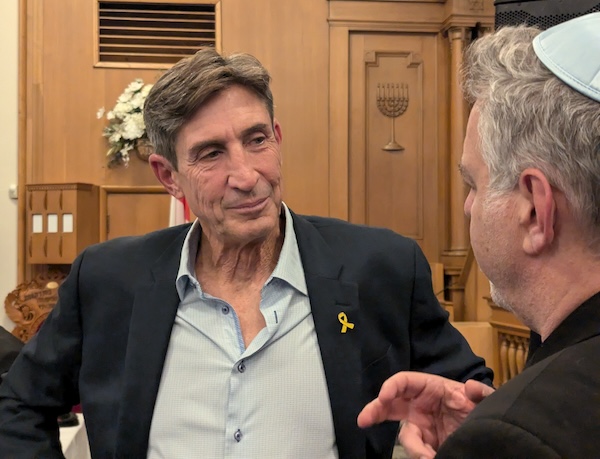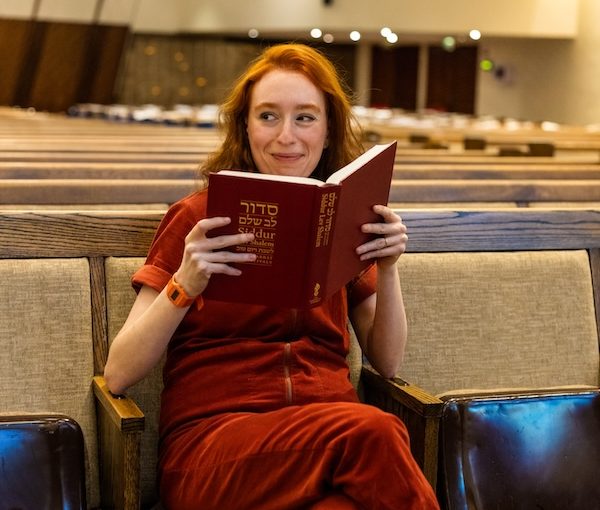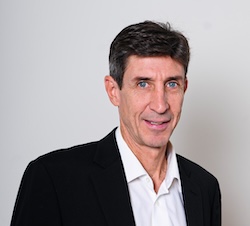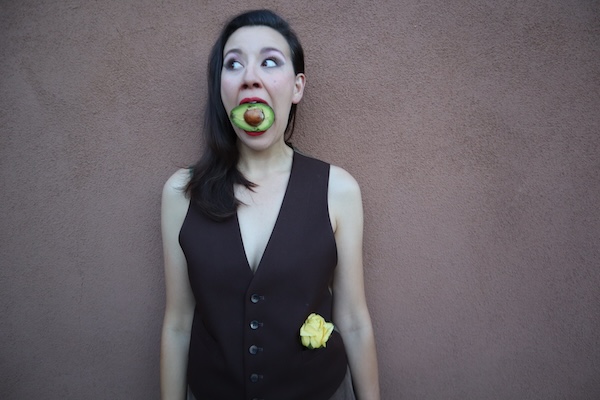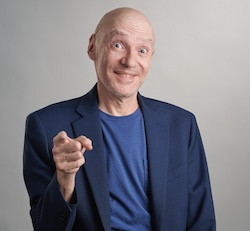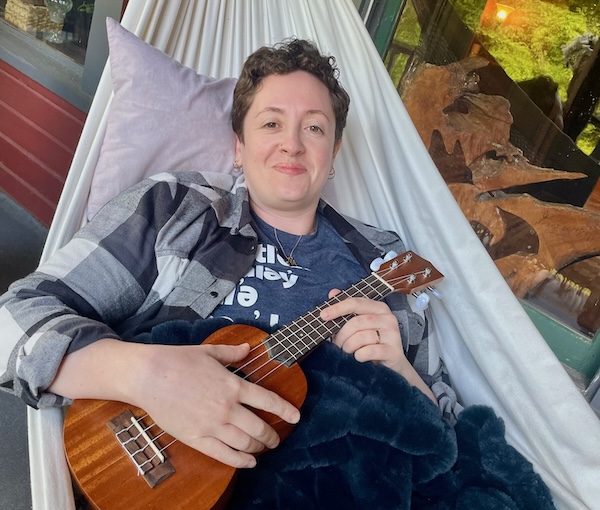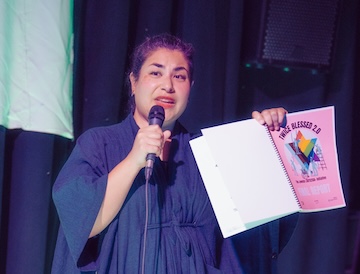Vancouver Talmud Torah students in the new Hildy Barnett Wellness Centre. (photo from VTT)
“It was a dream that came true,” said Jeffrey Barnett of the new Hildy Barnett Wellness Centre at Vancouver Talmud Torah.
The centre, named in honour of his late wife, was dedicated last November.
“As a graduate of Vancouver Talmud Torah and as a teacher of over 30 years, and also being a child psychologist, she knew the value of supporting kids in a Jewish environment,” said Barnett of Hildy, who died April 25, 2024. She and Jeffrey were married 47 years; they have two children and four grandchildren.
Hildy Barnett specialized in education for children with special needs. She worked with the Vancouver School Board for three decades and, after retiring, continued to work with children and teens in various capacities. She volunteered at Canuck Place and with the Jewish Community Centre of Greater Vancouver, among other things. She helped start Jewish Family Services Vancouver’s Innovators Lunch, with friends Naomi Gropper Steiner, z”l, and Kristina Berman.
Shortly before Hildy Barnett passed away, she and Jeffrey made the decision to fund the wellness centre at VTT. Hildy had asked Shirley Barnett, who had a relationship, via her sons, with Shane Foxman, associate director of development at VTT, to inquire about legacy opportunities at the school. Foxman connected Shirley with Emily Greenberg, VTT head of school.
“When Shirley first told me about Hildy, I asked her to tell me a bit more about what she did, her passions, her career,” Greenberg told the Independent. “It became almost immediately clear that she should be part of realizing the vision for the wellness centre. As her health diminished rapidly, Shirley came to the school and I told her to film me speaking about my vision for the space, the children it would serve and the reason we needed to create such a space for our students. I knew what I wanted it to look like, but I wanted to paint that picture for her. I remember, when we stopped recording, I had goosebumps because I could feel how special this room was going to become.
“We hurriedly sent the recording over to Hildy’s daughter, Mira, to show her in her hospital bed,” continued Greenberg. “I remember Shirley got a text back from her within a few minutes. She said that it was exactly what she had hoped for. Hildy, unfortunately, passed away just a couple hours later, but I have always been so grateful that she knew about the wellness centre before she left this world. I think this has made this work even more sentimental. We really wanted to get every detail right.”
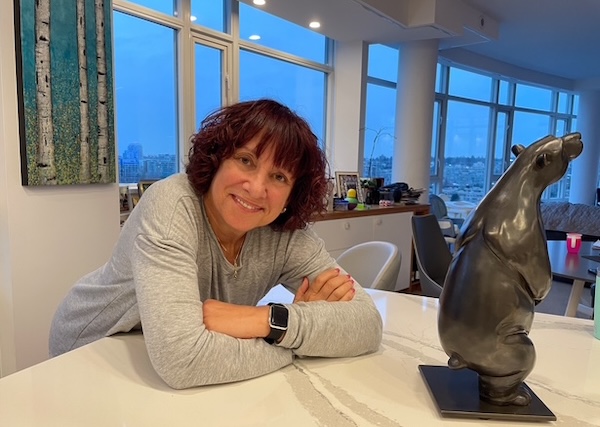
A VTT newsletter leading up to the centre’s November dedication noted, “Approximately 20% of our students require some form of extra assistance to fully engage in the curriculum and to meet their full potential…. Over the last several years, we have completed a landscape study to understand best practices for supporting students with learning needs and have implemented several new layers of services to help create unique learning pathways.”
The study comprised a review of what many other schools are doing for student support services, said Greenberg. “There were many takeaways,” she said, “but one of them was that the spaces we create can really enable the programming and support we want to offer. The wellness centre has catapulted our counselors from being in a windowless, uninspiring, tiny office to in a centre that exudes safety, support, belonging and comfort.”
Over the past five years, VTT has gone from having a half-time counselor to two full-time counselors: Donna Cantor and Shakaed Greif. The two are both experienced counselors who are helping “to better support our students, parents and, sometimes, staff, as they navigate the many pressures and challenges of life, especially in a post-Oct. 7 world,” said Greenberg.
The counseling team “has been imperative in helping our many new Israeli students settle into life at VTT. They also run many support groups, including our Free to Be Me club, Chesed club and more,” she said.
The Hildy Barnett Wellness Centre allows Cantor and Greif to have their own offices, as well as a shared space for working with small groups and families.
“When I look back, in a very quiet way, Hildy did what she loved and, having the facility at TT is the ultimate,” Jeffrey Barnett told the Independent. “It brought smiles to her face. She knew that she wasn’t going to be around. She knew that the legacy she was doing would benefit so many youngsters, including the fact that our own grandchildren would be at the school, and that not only this generation but future generations [would be helped]. And it made me feel good that she felt good. It’s still very sad, very touching, and we miss her a great amount.”
Barnett spoke of Hildy’s approach to education, which was based on the methods of the late Dr. Reuven Feuerstein, with whom Hildy Barnett had studied.
Feuerstein was a psychologist from Romania, who trained with the Russian psychologist Lev Vygotsky, explained Charlene Goldstein, who, with Hildy Barnett, years ago established with the Vancouver School Board a learning centre for speech language pathologists, teachers, counselors and others, which has since faded away. Goldstein is a registered psychologist in the neonatal follow-up program at BC Women’s Hospital and Health Centre; she also has a private practice.
“Reuven came to Israel right after the Holocaust and he began to work with children from the Holocaust, as he did with children from Ethiopia,” Goldstein told the Independent. “And what he saw was that these children only lived in the present, that they had limited memories of the past and very few [visions] of the future, and that was because, to protect them, their parents didn’t want them to know too much, plus they had a lot of losses. So, he had a group of volunteers together who would sit by the beds of these children, so if they had nightmares, they would calm them.
“Then, he began to notice that some people were saying that these children were incapable of learning, that type of thing,” she continued. “But what Reuven and Vygotsky believed in [is that] you can have direct learning, where, let’s say I’m a child and I’m looking at putting some blocks together and I figure it out and nobody has to tell me what to do. Or, you could have mediated learning, which is, someone is between the child and the activity helping them to learn what to do.
“So Reuven, and I still do this now – when a child says to me, I can’t do this, I say, well, what do you already know here? What do you already recognize? What about this is new? And I start asking questions about things. So, what do you call this? Oh, my goodness, look at all of these things that you already know. Reuven would also say to teachers, think of the child, and his logo was ‘just a minute … let me think.’ Because he believed, as I do, that everybody has the potential to think, everyone has the potential to learn. We may not all learn everything the same, but we have potential to learn. And that everyone has potential to give back to society.”
Part of the funds raised by the Hadassah Bazaars – which Hildy’s mother, Marjorie Groberman, helped start here and in other places across Canada – were sent to Israel to support Feuerstein with his work, said Jeffrey Barnett.
Groberman, who was “Mrs. Hadassah-WIZO for many years,” had heard Feuerstein speak at a Hadassah convention, said Goldstein. He was brought to Vancouver by Hadassah-WIZO and Variety Clubs International, with which Jeffrey Barnett was involved, she said.
Feuerstein came back to Vancouver many times, said Goldstein. When here, he trained many educators, including those who worked with Indigenous children.
“Some of the children would think he was Santa Claus and would call him that because he had a long, white beard and his beret,” said Goldstein.
Among the people in Feuerstein’s sphere was Dr. Lorna Wanosts’a7 Williams, an expert in Indigenous language revitalization and education. Williams met Goldstein and Barnett in the mid-1980s, when she was hired by the Vancouver School Board as a specialist in First Nations education.
“I was looking at Reuven’s work because of his ideas around what happens with children when they get separated from the knowledge, from their parents,” Williams told the Independent. (People wanting to know more about this aspect of Williams’s work should watch the 1994 National Film Board of Canada documentary The Mind of a Child.)
Williams said Hildy Barnett was focused on “supporting all children to learn and enable them to overcome all their trauma. She just was so dedicated to that kind of work.”
Barnett knew how to move things along, said Williams. “She was able to bring people together in such a beautiful way.”
She added, “I really honour her for all the help she gave me and that she gave many other people. She was very quiet but she was very strong.”
Goldstein, who knew Barnett from having grown up in the local Jewish community, before they connected more in Hadassah-WIZO and with Feuerstein’s work, echoed Williams’s observation.
“Hildy had the most gentle voice, she had a great sense of humour, but she had strong determination,” said Goldstein. “In Star Trek, there’s one person who says, ‘Make it so,’ and that’s what Hildy was like. She would say, ‘Make it so,’ and you just didn’t say no to Hildy because Hildy listened to everybody and had such compassion, such compassion.”
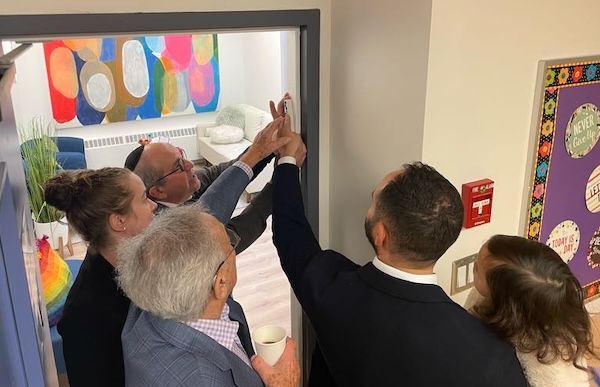
The Nov. 24, 2024, dedication ceremony of the Hildy Barnett Wellness Centre was originally envisioned as a small family gathering to honour Barnett’s legacy, said VTT’s Greenberg. “But, to our delight, she was so beloved in the community that many more people attended.
“I think it was an opportunity for many people to pay their respects to her powerful legacy of believing in children, and the Hildy Barnett Wellness Centre has become a healing place in so many ways, including for those who are grieving Hildy’s loss.”


